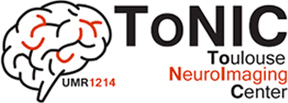Diffusion tensor imaging and gray matter volumetry to evaluate cerebral remodeling processes after a pure motor stroke: a longitudinal study
Résumé
Background and objectives Clinical factors are not sufficient to fix a prognosis of recovery after stroke. Pyramidal tract or alternate motor fiber (aMF: reticulo-, rubrospinal pathways and transcallosal fibers) integrity and remodeling processes assessable by diffusion tensor MRI (DTI) and voxel-based morphometry (VBM) may be of interest. The primary objective was to study longitudinal cortical brain changes using VBM and longitudinal corticospinal tract changes using DTI during the first 4 months after lacunar cerebral infarction. The second objective was to determine which changes were correlated to clinical improvement. Methods Twenty-one patients with deep brain ischemic infarct with pure motor deficit (NIHSS score ≥ 2) were recruited at Purpan Hospital and included. Motor deficit was measured [Nine peg hole test (NPHT), dynamometer (DYN), Hand-Tapping Test (HTT)], and a 3T MRI scan (VBM and DTI) was performed during the acute and subacute phases. Results White matter changes: corticospinal fractional anisotropy (FA CST ) was significantly reduced at follow-up (approximately 4 months) on the lesion side. FAr (FA ratio in affected/unaffected hemispheres) in the corona radiata was correlated to the motor performance at the NPHT, DYN, and HTT at follow-up. The presence of aMFs was not associated with the extent of recovery. Grey matter changes: VBM showed significant increased cortical thickness in the ipsilesional premotor cortex at follow-up. VBM changes in the anterior cingulum positively correlated with improvement in motor measures between baseline and follow-up. Discussion To our knowledge, this study is original because is a longitudinal study combining VBM and DTI during the first 4 months after stroke in a series of patients selected on pure motor deficit. Our data would suggest that good recovery relies on spared CST fibers, probably from the premotor cortex, rather than on the aMF in this group with mild motor deficit. The present study suggests that VBM and FA CST could provide reliable biomarkers of post-stroke atrophy, reorganization, plasticity and recovery. ClinicalTrials.
| Origine | Fichiers éditeurs autorisés sur une archive ouverte |
|---|---|
| licence |



